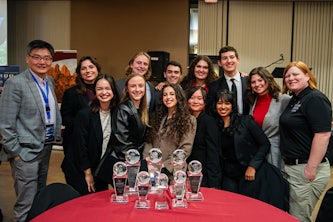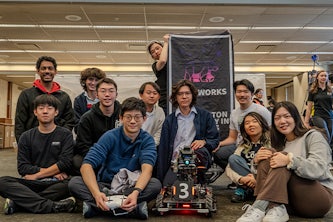WashU Engineering offers new master’s in health care operational excellence
The Master of Health Care Operational Excellence will equip leaders in health care and health-care management to improve the quality and efficiency of the U.S. health-care system using engineering systems processes

The School of Engineering & Applied Science at Washington University in St. Louis is offering a new master's degree that will use engineering principles to dramatically improve health-care operations.
The Master of Health Care Operational Excellence will equip leaders in health care and health-care management to improve the quality and efficiency of the U.S. health-care system using engineering systems processes. The degree, which will launch in Fall 2017, is designed for health-care management and staff both within hospitals and clinics, including physicians, nurses, pharmacists, lab technicians, imaging professionals, and in environmental services and facilities, and food service and nutrition, as well as operations managers and process improvement engineers. In addition, engineers and managers with experience in performance improvement in other professions outside of health care will benefit from learning the systems, tools and change management that are unique to the health-care environment.
Ultimately, graduates of the program would design systems that would improve patient experience and satisfaction, reduce costs of providing quality health care and save lives, said Aaron Bobick, dean of the School of Engineering & Applied Science and the James M. McKelvey Professor.
"Accompanying the ever-expanding capabilities of medicine has been an immense increase in the complexity of health-care delivery in the United States," said Aaron F. Bobick, dean of the School of Engineering & Applied Science and the James M. McKelvey Professor. "Health care is one of the leading industries in the St. Louis area, and there is a high demand for professionals who can make the health-care system both more effective and more efficient. This program takes advantage of the School of Engineering & Applied Science's expertise in engineering-based systems analysis and modeling to prepare these professionals to continue St. Louis' place as a national health-care leader."
Ed Borbely, associate dean and executive director of professional education in the School of Engineering & Applied Science, said the program applies the systems and tools that have been refined in other sectors, such as air transportation and manufacturing, to health care.
"Breakthroughs of systemic health-system improvement and cultural transformation will come from combining health-care expertise with industrial engineering, performance improvement and systems safety," Borbely said. "This will be the first program in the country that is developed with and for health-care professionals learning to apply engineering principals in their work."
The 30-hour program will teach students to apply analysis and improvement methods from industrial engineering and engineering management to their own operations in health-care.
"Implementing performance-improvement methods could reduce medical errors and ensure smooth processes from food service to filling prescriptions to operating room preparation to clinic visits," said Lisa Olenski, program director and executive director of transformation support for BJC HealthCare's Center for Clinical Excellence.
"All of the students will learn the principles and science of process analysis and optimization in health-care environments, and master the systems, tools and approaches to leadership that enable a culture of continuous systemic improvement and operational excellence," Olenski said.
Students will take 24 hours of core courses, including Lean Healthcare Concepts, Tools and Lean Management Systems; Six Sigma Concepts and Tools, and Project Management Fundamentals; six hours of electives; and complete a capstone project. Some courses will come from the Systems Integration and Project Management degree programs in the Henry Edwin Sever Institute in the McKelvey School of Engineering. Faculty will include instructors from the Henry Edwin Sever Institute in the School of Engineering & Applied Science and experienced engineering and health-care professionals from the community.
For more information or to apply, visit opex.wustl.edu.



